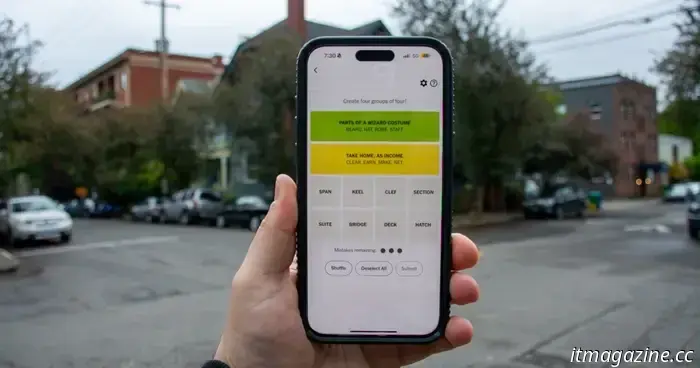
Experts recommend new training approaches that could facilitate the attainment of AGI.
Artificial intelligence (AI) could soon operate independently, and many companies are eager to facilitate this development as quickly as possible. Whether this is feasible is still uncertain; nonetheless, if successful, we may transition from the AI era to the AGI era faster than anticipated.
The recent surge in AI might appear abrupt to some, but the field has been evolving steadily for several decades. As technology progresses, the advancement of AI has accelerated, and many industry insiders are already focusing on the next significant breakthrough: Artificial General Intelligence (AGI). While AGI remains a theoretical idea for now, many believe it represents the next phase in training AI to possess autonomous intelligence.
There are numerous optimistic perspectives regarding AGI's potential as a valuable tool in various high-performance sectors, but there are also many questions and concerns. What constitutes AGI? Who stands to gain from this technology? What ethical considerations arise? Can it be regulated?
Several industry specialists have begun to explore this complex topic to uncover what lies ahead as we reach the critical point of the current AI version, particularly with large language models and reasoning models.
What is AGI?
As AGI is a continuously evolving concept, a variety of definitions have emerged. Numerous interpretations have been proposed by organizations and leaders in the field, such as OpenAI, different branches of Google, and Elon Musk, among others, suggesting that AGI models could emulate a range of human behaviors. Disagreements typically arise over the level of intelligence at which AI transforms into AGI, and when its capabilities would shift from typical artificial intelligence to something more advanced.
Jim Olson, Chief Technology Officer at ModelOp, told Digital Trends that this is the AGI breakthrough the industry is eager to witness.
“A model presented with a novel situation can rapidly and accurately identify the course of action or create new content on something it has never encountered before,” he stated.
Further elaborating on this function, Paul Roetzer, co-host of “The Artificial Intelligence Show Podcast," explained in episode 141 titled “Road to AGI (and Beyond)” that after mastering Chess at a high level, AGI would have the capacity to independently master other skills, such as playing video games or card games, having been trained only on the concept of games in general rather than on the specific games themselves.
Roetzer also cited a report from Google DeepMind in May 2024, which attempts to establish a cohesive definition for AGI and proposes a tiered system for ranking AI systems based on human task comparisons. This framework categorizes level 0 as lacking any AI or general software, level 1 as AI functioning as a tool, level 2 as AI functioning as a consultant—essentially models akin to the GPT-4 series, which researchers regard as an early form of AGI. Level 3 represents AI as a collaborator or competent AGI, while level 4 is defined as AI as an expert or expert AGI, and level 5 as virtuoso AGI or artificial superintelligence (ASI) representing further advancements in the field.
An unpredictable timeline
Many have speculated an early AGI emergence timeline from 2027 to 2030; however, several factors could influence this prediction. The necessity for data centers to equip new technology, environmental challenges linked to product development, and the growing demand for computational power from next-generation chips are all considerations for the companies involved.
“The amount of data required for this [technology] to function independently isn't there yet, but looking at the advancement trends, I would guess it might take another 15 years. Perhaps by 2040 or 2050, we might be close, but at this moment, I don’t see it,” Oracle developer Sheriff Adepoju informed Digital Trends.
He pointed out that there would likely be government and corporate implementations before it becomes accessible to the general public, which could lengthen the overall timeline.
Reflecting on the current AI revolution that started with OpenAI’s ChatGPT in late 2022, the technology is founded on developments dating back to the 1950s. The missing key was labeled data used for training large language models and the computational power of modern GPUs. However, Olson indicated that the industry is still awaiting that similar breakthrough for AGI.
“Someone might have a lightning-strike moment of genius and develop a technique that alters the timeline. If I were to wager, it’s going to be further down the road as we refine the capabilities that we’ve learned about LLMs,” he remarked.
“I believe we will start to see various techniques combine, but there will also be new components that will need to be invented, which we don’t yet know are necessary for achieving true AGI,” he added.
The potential of AGI development
Despite AGI's theoretical nature, there's a sense that the industry is bracing for both the positive and negative implications of this emerging technology. Brands have already begun



Other articles
 Have vinyl, will travel: Toshiba's latest Bluetooth record player allows you to do exactly that.
If you're searching for a method to enjoy your vinyl records while traveling, Toshiba has unveiled the AX-RP10, a portable Bluetooth turntable.
Have vinyl, will travel: Toshiba's latest Bluetooth record player allows you to do exactly that.
If you're searching for a method to enjoy your vinyl records while traveling, Toshiba has unveiled the AX-RP10, a portable Bluetooth turntable.
 NYT Crossword: solutions for Saturday, April 12
The crossword puzzle in The New York Times can be challenging, even if it's not the Sunday edition! If you're facing difficulties, we're available to assist you with today’s clues and solutions.
NYT Crossword: solutions for Saturday, April 12
The crossword puzzle in The New York Times can be challenging, even if it's not the Sunday edition! If you're facing difficulties, we're available to assist you with today’s clues and solutions.
 NYT Mini Crossword today: solutions for Saturday, April 12.
The NYT Mini crossword may be significantly smaller than a standard crossword, but it's still quite challenging. If you're having trouble with today's puzzle, we have the solutions for you.
NYT Mini Crossword today: solutions for Saturday, April 12.
The NYT Mini crossword may be significantly smaller than a standard crossword, but it's still quite challenging. If you're having trouble with today's puzzle, we have the solutions for you.
 NYT Connections: clues and solutions for Saturday, April 12.
Connections is the latest puzzle game from the New York Times, and it can be pretty challenging. If you require assistance in solving today's puzzle, we're here to support you.
NYT Connections: clues and solutions for Saturday, April 12.
Connections is the latest puzzle game from the New York Times, and it can be pretty challenging. If you require assistance in solving today's puzzle, we're here to support you.
 NYT Strands today: clues, spangram, and solutions for Saturday, April 12.
Strands offers a challenging twist on the traditional word search from NYT Games. If you're having difficulty and can't figure out today's puzzle, we've got assistance and clues for you right here.
NYT Strands today: clues, spangram, and solutions for Saturday, April 12.
Strands offers a challenging twist on the traditional word search from NYT Games. If you're having difficulty and can't figure out today's puzzle, we've got assistance and clues for you right here.
Experts recommend new training approaches that could facilitate the attainment of AGI.
Experts discuss the potential of AGI, highlighting its ability to transform industries while also addressing concerns regarding control and ethical considerations.
